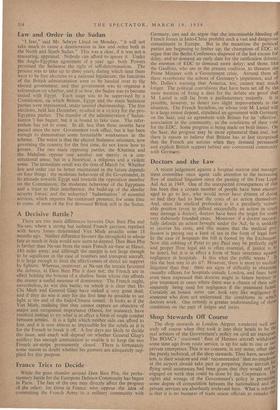While the guns thunder around Dien Bien Phu, the parlia-'
mentary battle for the European Defence Community has begun in Paris. The fate of the one may directly affect the progress Lof the other; for those in France who oppose the idea of committing the French Army' to a military community with Germany, can and do argue that the interminable bleeding of French forces in Indo-China prohibit such a vast and dangerous commitment in Europe. But in the meantime the political parties are beginning to limber up; the champions of EDC, to argue that the Berlin Conference disposed of the last excuse for delay, and to demand an early date for the ratification debate; the enemies of EDC to demand more delay; and those, like the Gaullists, who are in the present coalition, to threaten the Prime Minister with a 'Government crisis. Around them all there reverberate the echoes of Germany's impatience, and of Mr. Dulles's warning that America, too, cannot wait much longer. The political convulsions that have been set off by the mere mention of fixing a date for the debate are proof that M. Laniel is still far from a parliamentary majority. It is possible, however, to detect two slight improvements in the situation. The French Socialists, on whose vote M. Laniel will to a large extent depend, stipulated an agreement with Germany on the Saar, and an agreement with Britain for its ' effective' association in the community, as the conditions of their vote for the EDC. Some progress is being made on both issues. On the Saar, the progress may be more ephemeral than real; but there is reason to believe' that Britain has at last recognised that the French are serious when they demand permanent and explicit British support behind any continental community with Germany.


































 Previous page
Previous page